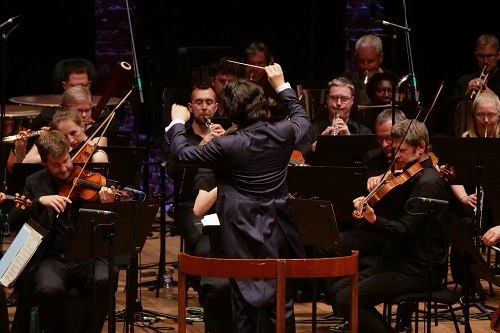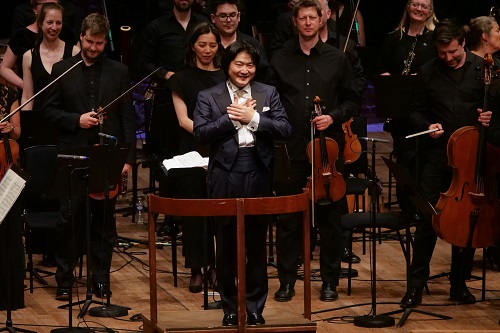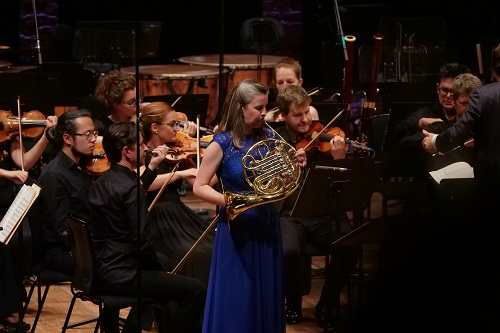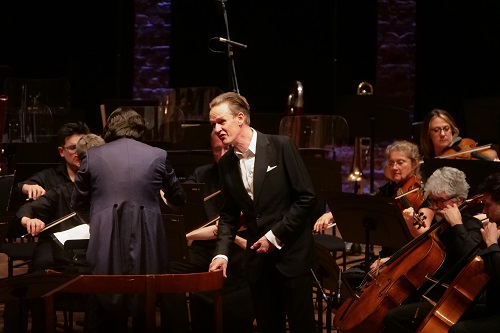We’ve become used to ‘hybrid’ meetings, where some members of a team meet in a workplace while others tune in from home, hotel rooms or elsewhere. Well, this is something of a ‘hybrid review’, because my plan to hear Ian Bostridge sing Britten’s Serenade for tenor, horn and strings with the City of Birmingham Symphony Orchestra last week, at the Aldeburgh Festival, was thwarted by road works and log jams on the A12. Arriving too late for the first half of the concert, I was consoled by the thought that the concert was to be broadcast on BBC Radio 3 the following week, so I would have a chance to hear the performance at one remove, so to speak; and, also by the fact that I did get to Snape Maltings in time to hear Kazuki Yamada conduct an account of Elgar’s First Symphony which somehow brought fervour and dignity into perfect balance.
In April this year, Yamada – who first led the CBSO as a guest conductor in 2012 and became Principal Guest Conductor in 2018 – succeeded Mirga Gražinytė-Tyla as Chief Conductor and Artistic Advisor of the orchestra (a post he holds alongside his role as Artistic and Music Director of Orchestre Philharmonique de Monte-Carlo, and various positions in his native Japan). A two-week tour of Japan in 2016 saw Yamada and the members of the CBSO perform eight concerts across the country and develop the strong bonds that were very evident at Snape Maltings.

One thing that was immediately evident at the start of Elgar’s ‘noble’ opening to the first movement was the sober precision of Yamada’s baton style, and this was matched by a sense that tempi would be judicious, as the stately progress of the preludial Andante unfolded with flowing conviction and richly blended sonorities which Yamada let fade elegantly to silence, before the shift to the fervour of the Allegro. The energy never flagged but it was the details of the score that kept the waters coursing, as Yamada opened up the textures to reveal the treasures within. The sense of grappling and struggling was brilliantly evoked, while never forfeiting control of the journey towards the triumph that would surely come.
But, before that we had a ghastly Mahlerian gallop (and that’s intended as a positive!) through the Allegro molto – again, the precision and detail were astonishing, the timpani thumps infernal. And, then, before we knew it, came a retreat into quiet slidings and scurryings that were anything but easeful and burst their seams with brio and bravura, only to be alleviated with snatches of melodic warmth. The transitions, dynamic contrasts, and juxtapositions of mood were brilliantly crafted by Yamada – the return of a hint of that nobilmente opening, all warm horns and misty strings, brought tear-pricks to the eye. And, if one doesn’t weep in the Adagio then something’s gone wrong: no such problem here. And, Yamada somehow coherently kept Elgar’s panoply of ideas in play as the motifs returned, intruded, disrupted, and the wrought conversations were released with breathless, blazing elation.

When Elgar’s First Symphony was first performed in 1908, the audience jumped to its feet and cheered. We didn’t quite have that spontaneity at the Maltings, but not far off! It was clear that the joy and affection for Yamada was shared both sides of the footlights.
The shadow of Peter Pears, for whom Britten wrote the Serenade for tenor, horn and strings in 1943 – and indeed that of the virtuoso horn-player Dennis Brain whose prodigious gifts inspired Britten’s musical daring and imagination – loom large over subsequent performers and performances. And, in his memorial tribute to Brain (1921- 1957) Britten noted that, ‘for a period it seemed that no one else would be able to play it adequately. But, as usually happens when there is a work to play and a master who plays it, others slowly develop the means of playing it too, through his example’. I’m not sure if she could sense the ‘ghosts’ in the Maltings, but Elspeth Dutch, the CBSO’s Principal Horn, certainly evinced a confidence and surety in the opening Prologue, not lingering, the horn tone true and strong, and initiating a slight pressing quality which would characterise the whole cycle, with tempi not dallying.

Of course, Ian Bostridge has found a personal way into the work, probing with characteristic perceptivity and a daring of his own. And, there was a tension within the ‘Pastoral’ (a setting of the 17th-century poet, Charles Cotton), despite the lazy syncopations of the strings and the horn’s relaxed echoing of the falling vocal line, as if the music was torn between sinking and surging. Bostridge’s tendency to slip into a semi-head voice at the higher-lying phrase openings was a little disconcerting, but there was a grace to the descents, and typical attentiveness to the verbal imagery, as Britten’s motifs highlight the way that the brambles, mole hills and small stripling are strangely magnified in the eerie shadows cast by the setting sun.
And, for all the ‘dying’ echoes in Tennyson’s ‘The splendour falls on castle walls’, which herald the descent of the night, the ‘Nocturne’ suggested the bright busyness of the nocturnal activity which eludes our sleeping eyes, the vocal line and horn bugle calls buzzing with buoyant energy, as Yamada sculpted the details of the string interjections with sparkling precision. Darkness fell in ‘Elegy’, though, Dutch swelling through the horn’s minor seconds with pained pointedness, then receding reclusively, the upper strings’ pulses insistent then ebbing, the lower strings’ pizzicatos pungent, urgent. Bostridge’s reticence was shattered by the explosive, almost gleefully burning rendition of Blake’s declaration that the storm ‘Has found out thy bed/ Of crimson joy’.
And, in ‘The Dirge’ (which sets an anonymous 15th-century text), the tenor seemed to mimic, then exaggerate with swooping glissandi and snarled words, the wounded distress of those horn seconds, creating a macabre blend of anger and gaiety. Nothing could have been further from the sustained mezza voce that Pears tended to employ. Nothing further than Britten scholar Christopher Palmer’s description of the song as ‘a bleached and spiritless song of the vanity of all human endeavour’, though Bostridge certainly struck the ‘mortal terror in our hearts’ that Palmer noted, with dramatic and audacious means.

The horn’s jaunty theme at the start of the ‘Hymn’ (a setting of Ben Jonson), with Dutch tripping nonchalantly through Britten’s acrobatics, seemed more than usually unsettling; and Yamada made the strings’ running pizzicatos throb tensely. Keats’ ‘O soft embalmer of the still midnight!’ was sung by Bostridge with discerning beauty, details such as the octave plunge for the oxymoron, “gloom-pleas’d eyes” and the feverish melisma of “forgetfulness divine” piquantly highlighted. There was a Grimes-like quality about the rhapsodic plea, “O soothest Sleep! if so it please thee, close/ In midst of this thine hymn my willing eyes”, and an anger which would have been fitting for the fisherman were rest to be denied, “the passèd day will shine/ Upon my pillow, breeding many woes”, as those groaning minor seconds crept back into the lower strings with striking vehemence. Bostridge relished the stretched syllables of the final couplet, “Turn the key deftly in the oilèd wards,/ And seal the hushèd Casket of my Soul”, blending agony and transcendence. Dutch’s Epilogue was both delivered off-stage and from ‘elsewhere’.
In a recent interview with Classic FM Yamada announced his intention to introduce Japanese music and Japanese culture to the CBSO’s musicians and audiences, but ‘poco a poco’. Perhaps in this spirit, this all-English programme opened with a nod towards Yamada’s native land. Gustav Holst wrote his Japanese Suite in 1915 for a Japanese dancer-choreographer, Michio Ito, who performed it at the Coliseum, and who also provided the composer with the themes. The bassoon solo which initiates the ‘Song of the Fisherman’ evinced a dreamy languor but also had an innate intensity which blossomed when taken up by the violas against shimmering harp and violin oscillations. Yamada controlled the gradual enriching of the sonic canvas – textural and harmonic – expertly, and the theme, when later reprised, was imbued with aching warmth by the lower strings.
The ‘oriental fifths’ of the ‘Ceremonial Dance’ similarly grew from gentle rhythmic impetus to imposing stateliness, glossy brass shining, but the music always had air to breathe. Similarly, the ‘Dance of the Marionette’ had a will-o’-the-wisp mercurialness. The spacious wistfulness of ‘Dance Under the Cherry Tree’ was heart-aching, woodwind solos unwinding melancholically against a whispering harp, the upper violins adding a delicate melodic warmth towards the close. Such fragility was brusquely swept aside by the menace of the ‘Dance of the Wolves’ with Yamada ratcheting up the tempo towards the explosive close, attention to detail and dramatic impetus making equal impact.
If Yamada’s account of Elgar’s First Symphony had dispelled any doubts that one might have had about a Japanese conductor’s ability to ‘get inside’ a symphony which, even today, seems to embody – however misguidedly – notions of ‘Englishness’, then this crystalline performance of Holst’s brief but colourful suite provided a persuasive and evocative blend of native flavours.
This concert was broadcast on BBC Radio 3 on Thursday 22nd June and is available for 30 days.
Claire Seymour
Ian Bostridge (tenor), Elspeth Dutch (horn soloist), Kazuki Yamada (conductor), City of Birmingham Symphony Orchestra
Gustav Holst – Japanese Suite Op.33
Britten – Serenade for tenor, horn and strings Op.31
Elgar – Symphony No.1 in A flat Op.55
Snape Maltings, Snape, Suffolk; Thursday 15th June 2023.
ABOVE: Elspeth Dutch, Ian Bostridge, Kazuki Yamada and the CBSO at Snape Maltings © Britten Pears Arts